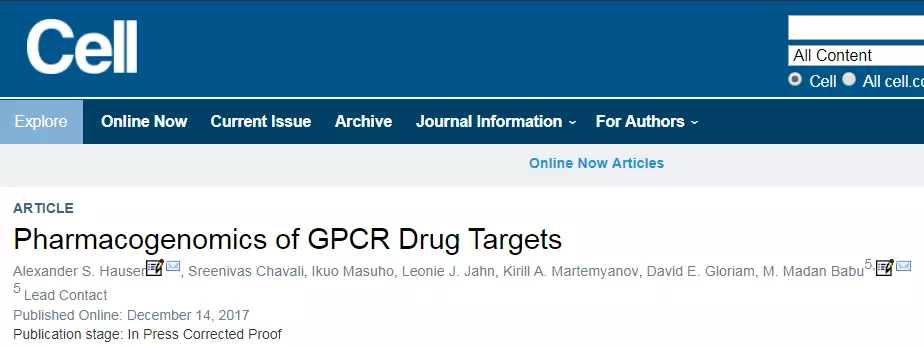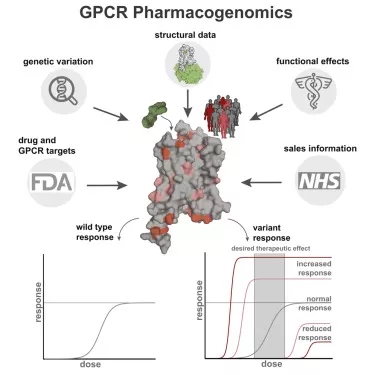Cell: Does the drug's efficacy vary from person to person? Gene mutations are "in the blame"!
December 20, 2017 Source: Bio Discovery
Window._bd_share_config={ "common":{ "bdSnsKey":{ },"bdText":"","bdMini":"2","bdMiniList":false,"bdPic":"","bdStyle":" 0","bdSize":"16"},"share":{ }};with(document)0[(getElementsByTagName('head')[0]||body).appendChild(createElement('script')) .src='http://bdimg.share.baidu.com/static/api/js/share.js?v=89860593.js?cdnversion='+~(-new Date()/36e5)];Studies related to G-protein coupled receptors (GPCRs, currently the most important drug targets) have won five Nobel Prizes. Recently, a team of scientists from the United States has harvested a new discovery about GPCRs!

Image source: Cell
On December 14, the latest study published in Cell magazine, scientists from institutions such as the University of Copenhagen and the MRC Molecular Biology Laboratory explored the GPCR drug targets in individuals by mining existing data sets. The degree of mutation at the point and reveals the effect of these mutations on the efficacy of the drug.
GPCRs are the largest family of membrane proteins in the human genome and play an important role in human physiological metabolic activities such as vision, smell, taste and neurotransmission. Research on GPCR has dramatically changed our understanding of life activities and revolutionized modern medical research.
In this new study, scientists first analyzed the whole genome sequencing data from the “1,000 Genomes Program†(about 2,500 participants) and the exome data from the “ExAC Program†(over 60,000 participants). Mutations in human GPCRs; then, using structural data, key sites in GPCRs were analyzed to reveal which mutations are more likely to alter the effects of the drug.

Image source: Cell
The results showed that an average of 3% of people contained a mutant GPCR receptor that could affect the drug's effect. Receptors containing such mutations may mean that the efficacy of the drug is reduced, and it may mean that the drug will not work at all or have an adverse effect on the patient.
Alexander Hauser, the first author and co-author of the paper, explained: “3% of the affected population refers to the average. For some important recipients, the affected population is much larger. For example, for diabetes drugs For the target GLP1 receptor, the associated mutation occurred in 69% of the population, while the CNR2 receptor (the drug that mitigates the malignancy induced by chemotherapy by targeting this receptor) is 86%. â€
In summary, the authors believe that the existence and potential impact of differences in drug response between individuals is a strong evidence for further research in this area. At the same time, these new findings are also a good proof of why personalized medicine will be the inevitable development direction in the medical field.
Reference materials:
1) Distinct human mutations can alter the effect of medicine
2) Interview with Zhejiang University's "80s" Bo Zhang Haitao: Cell and Nature crack the cardiovascular disease drug target structure
Offer Medical Cord Clamp,Medical Use Clamp,Sterilized Umbilical Cord Clamp From China Factory .China Medical Cord Clamp,Medical Use Clamp factory, visit here to find the Sterilized Umbilical Cord Clamp,Pe Material Umbilical Cord Clamp that you are searching for.Medical Cord Clamp,Medical Use Clamp,Sterilized Umbilical Cord Clamp,Pe Material Umbilical Cord Clamp
Medical Cord Clamp,Medical Use Clamp,Sterilized Umbilical Cord Clamp,Pe Material Umbilical Cord Clamp
Luck Medical Consumables Co.,LIMITED , https://www.luckmedical.com